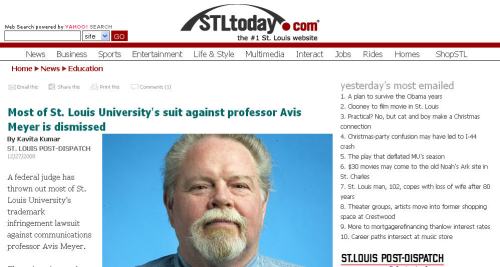This letter is written in response to last week’s editorial “News mentor banned in body, not spirit,” which would appear to support Dr. Avis Meyer’s unqualified right to do anything he might wish to do in the workplace.
This impression is created most strongly in an emotional paragraph that suffers, among other things, from slippery-slope “logic.” There, the authors begin by posing four exaggerated rhetorical questions designed to make it seem that the principled, and limited, restriction that has been placed on Dr. Meyer following review of his actions with the paper’s advisory board is outlandish. And these questions, in turn, lead the authors to conclude, self-righteously, that “the University community should be alarmed by this violation of academic freedom.”
This emotional outpouring ignores the fact that professional behavior, by its very nature, assumes the existence of reasonable behavioral boundaries; that the University has provided increased support to the student newspaper in recent years, including the creation of a full-time adviser position; that Dr. Meyer has not been the University-appointed adviser to the paper for the better part of a decade and that the decision to limit Dr. Meyer’s access to the student newsroom followed a process and is not predicated on the base motive the authors attribute to University administrators.
Moreover, those who understand the cornerstone principle of academic freedom should recognize that this decision in no way violates Dr. Meyer’s academic freedom.
Law professor Stanley Fish observes in Tuesday’s online edition of The Chronicle of Higher Education that “the trouble with the term ‘academic freedom’ is that the emphasis almost always falls on the ‘freedom’ part rather than the ‘academic’ part, with the result that the concept is made to seem much grander than it is.”
The classic definition of the term was formulated in 1940 by the American Association of University Professors and contains three elements: (1) “teachers are entitled to full freedom in research and in the publication of the results, subject to the adequate performance of their other academic duties”; (2) “teachers are entitled to freedom in the classroom in discussing their subject, but they should be careful not to introduce into their teaching controversial matter which has no relation to their subject” and, even then, there may exist “limitations of academic freedom because of religious or other aims of the institution” and (3) when faculty “speak or write as citizens, they should be free from institutional censorship or discipline, but their special position in the community imposes special obligations” on them-including to “at all times be accurate,” to “exercise appropriate restraint” and to “show respect for the opinions of others.”
None of these three guarantees applies to a faculty member assuming an extracurricular role he or she has not been assigned to undertake-especially when the University has assigned the role to someone else!
Notice, too, that the freedoms outlined within the concept of “academic freedom” are limited as well as specific. Each of the AAUP provisions carefully balances rights against responsibilities, since that is what professional behavior demands. Dr. Fish aptly concludes his Chronicle article by noting that “invoking academic freedom carries with it the danger of thinking that we are doing something noble and even vaguely religious, when in fact what we are doing, or should be interested in doing, is no more – or less – than our academic jobs.”
Contrary to what the editorial’s authors would have readers believe, SLU administrators value and aggressively defend the academic freedom of our faculty members. But the University does not, and never will, affirm the misguided assumption that any behavior, especially behaviors which interfere with the ability of other faculty and staff to perform their assigned duties, is OK.
Finally, for those who have tried to make this a First Amendment issue, the publication of the “News mentor” editorial last week should again make it clear that the University has never attempted to control the editorial content of the student newspaper.
Joe Weixlmann, Ph.D.
University Provost
It’s been awhile since we’ve heard anything from the Provost. What do you think of his letter?

